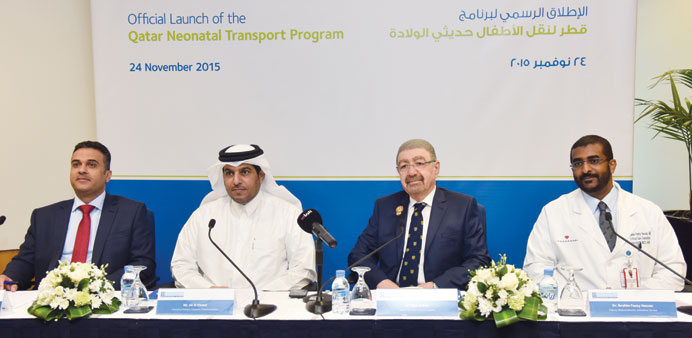HMC officials announcing details of the Qatar Neonatal Transport Programme yesterday. PICTURES: Noushad Thekkayil
By Joseph Varghese/Staff Reporter
The mortality rate of newborns in Qatar came down to 1.13% from 3.82% during a 12-month pilot programme launched by Qatar Neonatal Transport Programme, an official said yesterday.
“During the 12-month pilot programme, 88 cases were transported from various hospitals in the country to Women’s Hospital,” said Dr Fouad Abounahia, director, Qatar Neonatal Transport Programme.
As many as 80% of the transfers were from Al Wakra Hospital and Al Ahli Hospital. The most common reasons for transfer were lung disease, heart disease and congenital abnormalities.
Dr Hilal al-Rifai, medical director, Women’s Hospital, said that there was only one death during the whole pilot programme. “The objective is to attend zero percent death rate among the newborn
babies.”
Dr Abounahia said that there were 23,000 births last year and more than 18,000 of them took place in Women’s Hospital. “At present, Women’s Hospital is the only facility in the country with the Level 3 tertiary facilities. It has all the specailised services including many sub-specialties. Therefore, any specialty care needed, can be given at Women’s Hospital,” he
explained.
The official said that presently, only ground transport is provided for this initiative. He noted: “We are looking to cover about a distance up to 150km using only ground transport. We may consider air transport service later if the need arises.
“We are planning for two dedicated transportation units. Each unit includes a physician, nurse and respiratory therapist and two EMS unit members. Altogether 20 doctors, 20 nurses and 12 respiratory therapists work in the whole programme which is available 24X7.”
Dr Abounahia said that the programme is open to all the public and private hospitals in the country. “Proposed guidelines have been written and given to all the hospitals. Criteria for transportation are clear and communicated to all the hospitals. We can plan for the transfer of the mother or neonatal transfer and repatriation. We get the baby to the specialised centres, treat and send the baby back to the home hospital.”
Dr Ibrahim Fawzy Hassan, deputy director, MICU and deputy medical director of Ambulance Services, said that the facility provides instant care and 360 degree access for the patient.
“The ambulance is fixed with all the necessary facilities for any emergency situation. It has two ventilators that provide oxygen continuously for 10 hours. During the pilot phase, the minimum time taken for completing the whole process was two hours and the maximum was 4 hours,” he added.

